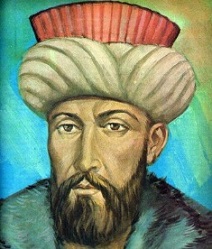According to latest Ottomanist scholarship, the alleged long term Ottoman decline was little more than a myth, distorting Ottoman history rather than helping clarify it. Rather than speaking of Ottoman decline, it would be more correct to say what occurred was an adjustment of Ottoman methods of rule and the balance of power within the empire to changing global circumstances.
Problems and Issues: Ottoman Decline
The Ottomans were aware of dislocations and problems in their system and would often pass reforms to address them throughout their history thereby ensuring the longevity of their rule.
Mustafa Ali (1541-1600) was a military man and a vocal critic, believing a system that did not promote men of his ability must have deep-seated flaws. The inability to enforce good governance, particularly at the frontier provinces was seen as reflective of government weakness.

Their views have been used uncritically to bolster the paradigm of decline, measured from the golden age of Suleiman, enjoying popular support until relatively recently. With an absence of correlating trends and their effects beyond this period, his generalised conclusions are empirically questionable.
In contrast, Ahmed Resmi (1700-1783), an active political figure who had travelled beyond the borders in an official capacity, warned against the futility of rulers attempting to conquer more lands than resources allow, as it would exhaust the subjects and have little to show. The eighteenth century saw advice move to the avoidance of wars for which the state was ill-prepared, in particular the disastrous six year war with Russia, 1768-1774, and the adoption of Western technology. This shift in discussion to address contemporary problems facing the Ottomans following centuries of growth and expansion was a shift from the decline thesis.
The nineteenth century saw Ahmed Cevdet produce his history of the Ottoman Empire from 1774 to 1826. He did not believe or consider there to be a long-term decline, but the specific problems and challenges that required solutions, primarily the diplomatic crises of the period.
It would be safe to say there was no long term decline visible to any of the writers in the early centuries of Ottoman rule.
Long Term Ottoman Decline
The late nineteenth and early twentieth century however brought a host of new theories emphasising a decline, each generally falling in one of three categories: intellectual, political and cultural.
A number of scholars, particularly Muslim scholars, argue the Muslim world went through an intellectual decline, commencing around the twelfth century with the cessation of ijtihad (research). To support this view, twelfth century official pronouncements prohibiting ijtihad are cited. The continued existence of jurists undertaking this activity, especially in the Shiite world, would suggest these pronouncements did not have the intended effect. More importantly, it has not been shown how these pronouncements contributed to stagnation or decline in social institutions or processes.
This was a strange claim as the Ottomans deemed education important, instituting madrasas in the fourteenth century, which grew in numbers and evolved in content over the centuries. The Ottoman focus on military schools, rational subjects and sciences was revived from the seventeenth century onwards and increased under the tanzimat reforms of the nineteenth century. Factors like economic instability, loss of territories and weakening of central government may have had more of a negative impact on scholarly activities that deficiencies in the education systems.
Sarton, Sachau and Wiet et al argued moderate views were hijacked by "pious bigots" thus enslaving thought. The eleventh century was seen as a turning point and "had it not been for Ashari and Ghazali, the Arabs might have been a nation of Galileos, Keplers and Newtons." Muslims were thus seen as encouraging the tradition of esoteric theology and discouraging works of secular human affairs. These views have been critiqued by a number of researchers as simply ahistoric and incorrect.
Christop Neuman cites Cantemir and Marsigli, who had spent time in Istanbul, arguing this idea was partly boosted by the influence of Edward Gibbon's History of the Decline and Fall of the Roman Empire (1782–8); unfortunately it was to prove detrimental to their understanding of the Ottoman Empire as the decline thesis.
The American historian Bernard Lewis in his book "What Went Wrong?" argued cultural barriers prevented the Islamic world from entering modernity, including the place of women, absence of political secularism and resistance to the "systematic" quality of modernity, necessary for industrialisation. Alam provided a detailed refutation of Lewis's views, starting with an analysis of his prejudicial "Orientalist" approach that Edward Said criticised in the 1960s, the lack of a global context to his narrative, an ahistorical incongruence and contradictions and a lack of objectivity in his writings.
The Ottomanist scholar Donald Quataert disputes nationalist tendencies caused the state's demise, claiming few called for breaking away from the empire with the overwhelming majority expecting and opting to remain within an Ottoman system. He believes nationalist sentiments and stereotypes were found, invented and magnified in post-Ottoman nation building - he too rejects a long term Ottoman decline thesis.
Many previous scholars failed to entertain the notion of a general decline, whether for the Ottomans or the Muslim world in general - the historian Marshall Hodgson for instance in his sweeping history of Islamic civilisation in the 1960s wrote:
"...in its own setting, the age of the sixteenth and seventeenth centuries was one of the greatest in Islamic history. The artistic, philosophic and social power and creativeness of the age can be symbolized in spaciousness, purity, and overwhelming magnificence of the Taj Mahal at Agra. In some sense, there was a great florescence."
Contemporary Ottomanist Scholarship
Recent scholarship however, is much more critical of the all-encompassing nature of decline theories.
Toledano argues the increased scope and sophistication of Ottoman studies makes a uniform view difficult to justify:
"...that the processes that unravelled during the period of so-called decline as manifestations of remarkable adaptation to changing realities, which reflect the resourcefulness, pragmatism, and flexibility of the Ottoman imperial system, rather than its ineptitude". Overemphasis on local and Arab historiography, "has managed to submerge imperial history and pronounce the virtual disintegration of Ottoman central authority, its projected power, economic significance, and sociocultural influence".
Likewise the Ottomanist Soraya Faroqhi when considering Ariel Salzmann's research:
"Recent work concerning Ottoman provinces, often focused on the Arab world, has permitted us to better understand the dynamics inherent in seventeenth and eighteenth-century decentralisation, which can no longer be regarded as a manifestation of 'Ottoman decline' and a precondition for proto-nationalism."
The Ottomanist Carter Findley in his research explains how the complex Ottoman system fundamentally changed between 1603 and 1838. Whilst scholars saw such changes as a decline, if certain things fell during this period, others rose with no single upward or downward trend emerging over the two centuries. He goes on to say "Even the shorter-term trends mask divergent trajectories followed by different parts of the imperial system." Analogously, the period seventeenth and eighteenth centuries are characterised as decentralisation and weakening state power
"yet the formation of new provincial power centres signify emergence of new interlocutors between state and society and the creation of denser centre-periphery linkages, at least until late eighteenth century crises provoked a trend back towards centralisation."
Rather than speaking of Ottoman decline, it would be more accurate to say that what had occurred was an adjustment of Ottoman methods of rule and the balance of power within the empire to changing circumstances.

Suraiya Faroqhi, a leading Ottomanist expert, cites earlier scholars who realised with the commencement of archival studies, details as well as major generalisations would need to be modified or even totally discarded. She cites errors present in secondary literature passed over by generations,
"Some errors may be just amusing, such as the story that the heads of the Ottoman religious-cum-legal hierarchy, the seyhulIslams, if executed, were ground to death in a gigantic mortar and pestle... Others are more serious and have much hampered research, such as the inclination to explain anything and everything by Ottoman decline."
Donald Quataert, a leading Ottomanist, commented
"Given the nationalist logic of the nineteenth- and twentieth-century history writing, the Ottoman legacy has been difficult to assess and appreciate. The biases come from many sides... Old fears have persisted to the present day and arguably have been transformed into cultural prejudices... Moreover, nationalist histories have dismissed the place of the multi-ethnic, multi-religious formation in historical evolution... In the more than thirty countries that now exist in territories once occupied by the Ottoman Empire the Ottoman past until recently has been largely ignored and/or considered in extremely negative terms."
Others have argued Arabs and Turks in seeking a new identity and foundation for their states exhibited similar hostility, preferring to go back to the Pharaohs, Kings of Babylon and the Hittites of pre-Ottoman Anatolia. This hostility and often vilification, appears less to actual Ottoman policies and more to their state building processes.
Doumani's study of the Arab region of Ottoman Palestine notes:
"...most Arab nationalists view the entire Ottoman era as a period of oppressive Turkish rule which stifled Arab culture and socioeconomic development and paved the way for European colonial control and the Zionist takeover of Palestine... The intellectual foundation for this shared image can be traced to the extensive literature published during the nineteenth and early twentieth centuries by Westerners bent on discovering... the Holy Land from what they believed was a stagnant and declining Ottoman Empire"
Bernard Lewis concludes the change of relationship between Europe and Middle East produced a Western Upsurge theory and the Ottoman state did not suffer an absolute decline. The West relatively overtook it obviating the need for explaining a decline however raising the question, "What Went Right in the West?"
"Rather than speaking of [Ottoman] decline, it might be more correct to say that what had occurred was an adjustment of Ottoman methods of rule and the balance of power within the empire to changing circumstances. By the end of the eighteenth century the Ottoman dynasty had existed for 500 years and had been ruling most of the Arab countries for almost 300; it was only to be expected that its ways of government and the extent of its control would change from one place and time to another."
Conclusion
Rather than speaking of Ottoman decline, it would be more correct to say what occurred was an adjustment of internal Ottoman methods of rule and the balance of power to changing global circumstances.
What we provide!
Vote Content
Great answers start with great insights. Content becomes intriguing when it is voted up or down - ensuring the best answers are always at the top.
Multiple Perspectives
Questions are answered by people with a deep interest in the subject. People from around the world review questions, post answers and add comments.
An authoritative community
Be part of and influence the most important global discussion that is defining our generation and generations to come